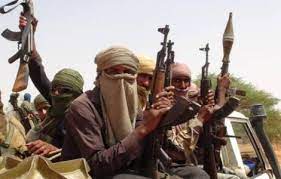The chiefs of staff of the Economic Community of West African States have weighed the pros and cons of a “kinetic operation” and “support and assistance missions” to jihadist-infested Burkina Faso.
By Ibrahima Dione
How to drive terrorism out of West Africa? This is the concern of the chiefs of staff of the armies of the countries in this part of Africa where many jihadist groups are active.
Senior military officers from Benin, Cabo Verde, Cote d’Ivoire, The Gambia, Ghana, Liberia, Niger, Nigeria, Sierra Leone, Senegal and Togo met in Guinea Bissau to give substance to the instructions of the Conference of Heads of State and Government of the Economic Community of West African States (ECOWAS).
The Commission of the regional organization, at the end of its 62nd Ordinary Session held on December 4 in Abuja, Nigeria had the mission to provide a framework for exchanges between the Chiefs of Staff on the issue of jihadism.
Their meeting finally took place on December 19 in Guinea Bissau.
But the Operations Officers (December 17) and the Chiefs of Intelligence (December 18) began the reflection.
In a communiqué, ECOWAS detailed the two options discussed by the chiefs of staff.
The first, the document states, “consists of force projection for offensive search and destroy missions, protection of civilian populations, and securing critical sites and infrastructures.”
However, the military caution that it “involves political difficulties (the need for acceptance by the host country and the sensitivity of public opinion), significant financial constraints and its long-term operational effectiveness is not guaranteed in view of previous experience.”
The second option is “support and sustainment missions based on the implementation of critical capabilities (intelligence, air support, logistics, command and control, training and education) for the benefit of the affected member states.” Representatives from Burkina, Mali and Guinea, which are under ECOWAS sanctions because of their armed takeover, did not attend the Chiefs of Staff meeting.
These absences were deplored by the participants “given the impact of terrorism in (the first two countries mentioned above) and the fact that they have an important role to play in the search for lasting solutions.”
This is why one of the recommendations to the ECOWAS Commission is to invite “all ECOWAS member states, including those under sanctions, to all discussions on security issues.
There is also the establishment of a planning group to refine options and make proposals that will be presented to the Committee for validation, the review of ongoing counter-terrorism initiatives and capitalization on good practices, the consideration and support of existing initiatives among member states that have proven their effectiveness, and the strengthening of national capacities to enable each members to meet its primary responsibility to ensure security on its territory.
In addition, the Conference of Heads of State and Government of ECOWAS decided to set up a regional force that could intervene anywhere in the sub-region in the event of a coup.
In this regard, the Chiefs of Staff consider that the ECOWAS Standby Force “already constitutes an operational framework dedicated to all forms of intervention.
”However, the restoration of constitutional order requires that it be given a mandate and the necessary capabilities.”
They also emphasize that “this intervention is complex and its implementation could prove difficult, especially when the population and/or a large part of the armed forces support the unconstitutional change in the country concerned.”
ID/te/fss/as/APA


